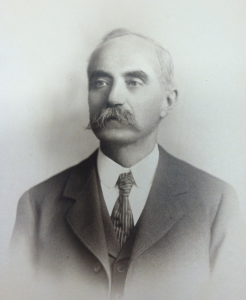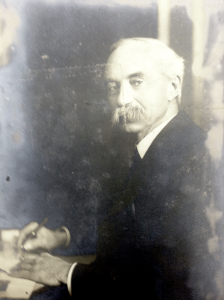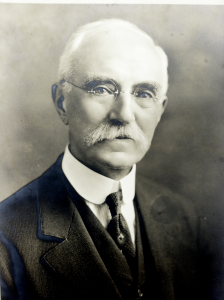Egbert T. Bush, for More Than 40 Years a Schoolmaster, Dies
Hunterdon County Democrat, November 25, 1937
This obituary was (almost certainly) written by D. Howard Moreau, one-time owner of the Hunterdon County Democrat, and long-time friend and admirer of Egbert T Bush.
Moreau helped persuade Mr. Bush to write his many historical articles for the Democrat. Because I am republishing the Bush articles with commentary, I thought it would be wise to publish his obituary now rather than wait until I had published all of his articles. I might not live that long; so far I’ve only published 11 (out of about 198). Another reason for publishing the obituary now is that, while researching Bush’s article on the Anderson Bray farm, I came upon photographs of Mr. Bush in the Bush Papers at the Hunterdon County Historical Society. I found them fascinating, and needed the proper vehicle for publishing them. Unfortunately, none of the photographs had dates. Nor did they have names, and I made the mistake of assuming that the oldest face was Mr. Bush in his 80s. But after looking through copies of his articles, I realized that the picture was of Elias L. Dalrymple, and have therefore removed it from the post. The remaining three photographs appear to be Mr. Bush in his 50s, 60s, 70s. Personally, I think he looked best (and most dapper) when he was in his 70s, demonstrating the truth of his poem, “When Leaves Grow Grey.”
Egbert T. Bush, known by thousands of residents of Hunterdon County, many of whom were his pupils during the forty years he taught in the public schools of this county, died at the home of his daughter in Center Bridge, Pa., Sunday afternoon, Nov. 21, 1937, after an illness of a week.
Mr. Bush had been in failing health for a number of years but in spite of his advanced age of 89, retained his characteristic keen interest in affairs. Death was caused by a complication of ailments brought on by his advanced age.
Perhaps no schoolmaster in the history of Hunterdon County made his influence more widely felt or held the respect and esteem of a larger number of pupils than did Egbert T. Bush. Largely self-educated, he was nevertheless a man of high scholarly attainment as was evidence by his writings, his interest in historical, educational and scientific subjects and his service on important bodies where his advice and counsel were always valued highly.
Born Near Croton
Egbert Trimmer Bush was born June 21, 1848 near Croton. Once, commenting upon his early education, he said: “I grew up working, going to school when there was nothing else to do.” By sheer persistence, however, he did attain more schooling than the average country boy of his time, studying Latin, Greek, scientific subjects and mathematics, trudging off to Flemington when the day’s work was done to report to his teachers.
At the age of 20, Mr. Bush qualified for a Third-grade County Teacher’s Certificate; seven years later he earned a First-grade County Certificate and in 1885 he received the First-grade State Teacher’s Certificate. By 1916, he had taught forty years in the schools of Hunterdon County, holding contracts at various times for the schools at Croton, Larison’s Corner, Klinesville, Cherryville, Mount Pleasant and Van Dolah’s, all one-room typical country schools. Later he was principal at Frenchtown, at Stockton and for a number of years, of Reading Academy, Flemington.
Mr. Bush in 1871 married Sarah Eleanor Willson. Mrs. Bush died 51 years later, May 19, 1922, at Stockton, where they had taken up residence ten years before. Mr. Bush then went to live with his daughter, Mrs. Evelyn B. Johnson, of Center Bridge, where he died. Besides Mrs. Johnson, he leaves one son, Percy W. Bush of Sandy Ridge; a grandson, David Johnson of Center Bridge; a granddaughter Mrs. Henry Hartman of Center Bridge, and two brothers, Sidney M. Bush of Locktown and J. Wesley Bush of Lambertville.
Author of Several Books

While Mr. Bush, from boyhood enjoyed writing, it was not until the present century that he attained fame in the literary world.1 His first book, in 1904, was entitled “In the Grip of the Expert.” It was a novel. In 1910 he won the New York Herald prize for the best story written by an American school teacher. The title was “Dockerty.” A book of poems published in 1916 by Samuel French & Company, of Boston, bore the title “When Leaves Grow Old.” It was dedicated “To My Good Friend, Dr. George N. Best, whose skill, philosophy and kindly touches have smoothed over so many of the rough places of life.” Dr. Best will be remembered as the late Rosemont physician and botanist.
Mr. Bush was the author of many newspaper articles, scores of which were published in [the] Hunterdon County Democrat.2 Most of them dealt with Hunterdon County history, particularly the history of forgotten or nearly forgotten communities and seats of local industry in earlier days. In 1906 the North American Review published one of his articles, “A Rural View of Rural Free Delivery.” It was a reply to an attack on the R. F. D. system by General Hawkins, who was bitterly opposed to mail service for country residents. The article was syndicated and republished, being credited with having a wide influence in the fight to adopt R. F. D. service.
Authority on Agriculture
In addition to teaching, Mr. Bush was a farmer and an authority on agriculture, especially agricultural history of Hunterdon County. For a number of years he edited “Hunterdon County Board of Agriculture News.” From 1886 to 1892 he operated a farm at Quakertown and from 1892 to 1912 he owned and managed the farm where his son resides at Sandy Ridge.

From 1884 to 1895 Mr. Bush was a member of the County Board of Examiners for teachers and from 1917 to 1928 he served on the Board of Visitors of the New Jersey State College of Agriculture, a position in which he took a very active interest. When he was dropped from the Board, Rutgers College presented him with a beautifully embossed citation, setting forth the appreciation of the institution for his services. The citation was inscribed and in a red leather cover, hand tooled and hand illuminated. This Mr. Bush treasured highly. It was signed by Dr. John M. Thomas, Rutgers president, and Dr. Jacob G. Lipman, dean of the College of Agriculture.
Characteristic of the man is a little note of appreciation penned to the editor of the Democrat in March, 1928, after an editorial had appeared protesting his removal from the Board of Visitors. He said:
I have read with much interest both the report and your editorial in this week’s Democrat. Your kind words concerning myself and my work impress upon me the truth of a remark which I have often made when things did not go as hoped or expected, namely: ‘The loser is sometimes the winner.’ Your kindness makes me feel very much that way over this matter.
With sincere thanks,
Yours Truly,
Egbert T. Bush
Skilled in Mathematics
Mr. Bush was skilled in practical mathematics as well as in the science of the subject. When neighbors had puzzling problems it was to Mr. Bush they would look for the solutions. In fact he was the friend and adviser to a large clientele and at his office in Colligan’s Hotel, Stockton, in his later years he was to be found, as he put it, “busy with writing and reading and various things which folks find for me to do.” He did title searching, was a notary public and helped friends with minor legal problems and detail work that they placed in his care. Frequently he came to Flemington, in the course of his title searching work and here retained a wide acquaintance.
To a biographer Mr. Bush once remarked: “My life must appear drab when put on paper” but, he added, “Simple and unspectacular as that life has been, I have not found it drab, and do not find it so as the sun goes down in life’s west.”

The closing poem in his volume “When Leaves Grow Gray” expressed his philosophy of life. It follows:
“’Tis written so, old men grow gray;
But why should age be dark and sad?
By the same law old leaves look gay,
And closing days are doubly glad.
Let man so learn! dispensing cheer
From gathered joys of days long past,
May he grow happier year by year,
Like theirs, his brightest days his last.”
Mr. Bush was not a member of any church, but he took an active interest in the Old Quaker Meeting House at Quakertown, always being among those to attend the annual service and to supply this paper with an account of the meeting.
At the time of his death, Mr. Bush was still serving as secretary of the Delaware Township Vigilant Society, an organization with which he was long affiliated.
Mr. Bush held membership in many fraternal, agricultural and scientific organizations, including the following:
Orpheus Lodge No. 137, F. & A. M., Stockton; Lackatong Lodge No. 114, I. O. O. F., Quakertown; Capoolong Encampment Lodge No. 32, Quakertown; Sergeantsville Grange No. 101, Sergeantsville; Hunterdon County Pomona Grange, State Grange; Stockton Lodge No. 140, K. of P., now defunct; American Association for the advancement of Science, National Geographic Society and The Hunterdon County Historical Society.
Funeral services will be held Wednesday afternoon, Nov. 24, at 1:30 o’clock, from the home of his daughter at Center Bridge. Burial will be in Sandy Ridge Cemetery under direction of C. Walton Green of Rosemont, assisted by Poulson & Van Hise.
Correction, 4/11/12: I had mistakenly thought Mr. Bush had published 300 articles, but now find there were only 198, plus a letter or two. Only 198.
- It is ironic that when Bush took his examination for a teacher’s certificate in 1868 he scored highest in math and lowest (a 70) in writing. Even more surprising is that Bush always tested worse in writing than any other subject. I learned this from Bush’s article “1879 Copy Of Old Democrat Revives Memories Of Many Old Timers” published on Sept. 9, 1937. ↩
- As far as I can tell, about 198 articles written by Mr. Bush were published in the Hunterdon Co. Democrat. Barbara Charles, who did a magnificent job of compiling those articles and indexing them, seems to agree. A copy of her work can be seen at the Hunterdon Co. Historical Society. ↩